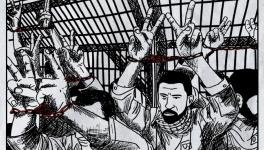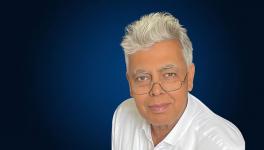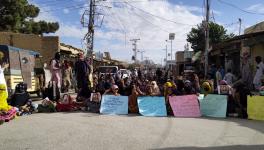Jammu: Families of Rohingya Refugees Who Tested Positive for COVID-19 in the Dark
Representational use only.
Rohingya refugees detained at a holding centre in Hiranagar, a town in Jammu’s Kathua district, have tested positive for COVID-19 during a special three-day testing drive. The drive, which began on May 24, was conducted in batches and had ended with 53 inmates testing positive. The patients, as per officials, are asymptomatic and are being held in isolation.
“The patients have been kept in isolation and their condition is being monitored,” said Kathua Chief Medical Officer Ashok Chaudhary.
The family members of the detainees, who are residing in camps in Jammu’s Kiryani Talab, were taken aback when they learned of the COVID-19 cases. They claimed that the jail authorities did not inform them.
“I learned that they had tested positive from a news report. We were not informed by the authorities. I don’t even know if my son is one of those declared positive for the virus,” said Abdul, one of the Rohingya refugees living in the camp. His son is in the holding centre.
On March 6, the Jammu police detained nearly 200 Rohingya refugees and sent them to a sub-jail that had been converted into a holding centre in Hiranagar. The detention happened after the Rohingyas were called to the Jammu’s famous Maulana Azad Stadium for a verification of their credentials. The police later maintained that detainees did not have “valid travel documents required in the terms of section (3) of the Passports Act.”
“After sending them to the holding centre, their nationality verification will be done as per the prescribed norms. Following that, the process to deport these illegal immigrants will be initiated (sic),” IGP (Jammu zone) Mukesh Singh had been quoted saying.
An order by the Jammu and Kashmir High Court in response to a Public Interest Litigation (PIL) prompted the verification and detention of Rohingyas in Jammu. The court was hearing a PIL filed by Hunar Gupta, who heads the Bharatiya Janata Party’s legal affairs wing in J&K. In its order, the court urged the government to explain what steps they were taking or planning to take identify illegal immigrants and take appropriate action.
Around 40,000 Rohingyas refugees, who are considered one the world’s most persecuted minorities, have crossed the border into India to flee persecution from Buddhist-majority Myanmar. They are living in camps in Jammu, Hyderabad, and New Delhi. Nearly, 6,500 are staying in the camps around Jammu.
The controversial Citizenship (Amendment) Act (CAA), 2019, allows Hindus, Sikhs, Buddhists, Christians, Parsis, Jains from Afghanistan, Bangladesh, and Pakistan to apply for Indian citizenship. However, the persecuted Rohingya refugees, who are Muslims, are not eligible to seek citizenship under the Act.
In addition, India is also not a signatory to the 1951 United Nations Refugee Convention, which outlines refugees’ rights and a country's legal responsibility to protect them. Human rights groups have maintained that the situation in Myanmar is still not suitable for the refugees to return. On February 1, the Myanmar military overthrew the elected government resulting in many crossing the border to seek refuge in India.
The families of the detainees told Newsclick that they had not spoken to them after Eid. “We have been really worried. Both my son and his wife are in the detention centre. I don’t know if they are fine,” Abdul added.
It was on Wednesday that Mushtaq Ahmad, a community leader of the refugees, called the CMO and jail authorities to check if what they had read was true. “I asked them why we were not told about the cases and why did we learn of them from the media. They said they had mild symptoms and that they would be alright and we needn't worry,” Ahmad told Newsclick.
On March 12, Ahmed and few other refugees had gone to meet the inmates on Eid and had exchanged sweets, but they have not able to speak to them even on the phone since. PK Modi, DySP/ I/C Superintendent at the Hiranagar holding centre, told Newsclick that they did not find it necessary to inform the families of the detainees.
“When they have been isolated and given treatment what was the need to inform the families. What will they do? They have mild symptoms and are being taken care of. Doctors are visiting them every two days and a protein-rich diet is being given to them. The elderly have also been vaccinated,” he added.
Modi confirmed that 220 Rohingyas were kept inside the holding centre including children, women and men. When asked why the families were not allowed to speak to the inmates, he said: “Detained Rohingyas don’t have their personal phones with them for security reasons. They would only be able to speak when they test negative,” he said.
“We really don’t know what exactly is happening. We should have atleast been informed,” said Ahmad.
Meanwhile, Modi believes the refugees are attracting a lot of attention. “I don’t know why every one is talking about it. The detained Rohingyas are enjoying their life in the holding centre. They get chicken and eggs to eat without doing any work. Had they been living in those jhuggis (camps), their lives would have been awful,” he claimed.
However, families of the detainees who have been meeting them inside the holding centre asserted that was not so. “They are given dal which is almost water. These claims that chicken and eggs are being given are wrong,” said Abdul’s wife , who has met her son and daughter-in-law in the holding centre.
After detainees complained about a lack of basic meals at the holding centre, Ahmad decided to deliver food on a weekly basis. “Every week we would go with food and snacks including home-cooked meat and anything the families wanted to give to them. They were earlier turning frail, but that has stopped after Eid,” Ahmad told Newsclick.
Get the latest reports & analysis with people's perspective on Protests, movements & deep analytical videos, discussions of the current affairs in your Telegram app. Subscribe to NewsClick's Telegram channel & get Real-Time updates on stories, as they get published on our website.
























